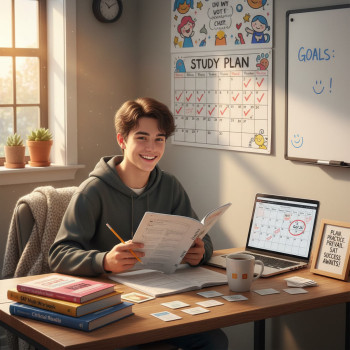Intro: When a Single Test Moment Feels Like the End of the World
It happens more often than families expect: a late start, a tech glitch in the Bluebook app, a misread question, or a full-on brain freeze during the Digital SAT. For a teen who’s been working toward college, a single test-day mistake can feel catastrophic. As a parent or student, your first reaction might be panic, frustration, or a desperate urge to fix it immediately. But what helps far more than reaction is response: the calm, caring, purposeful way we talk to each other after the test.

This blog is a toolkit: a set of ready-to-use scripts, conversation structures, and practical next steps to help students process disappointment, learn from the experience, and move forward. It blends emotional care with tactical planning—because healing confidence and planning better prep go hand in hand. Where helpful, we’ll mention how personalized services like Sparkl’s 1-on-1 tutoring and tailored study plans can support the next steps.
Why Words Matter: The Power of the First Few Minutes
The first phrases you say after a test shape the next few hours—or days—of your teen’s mindset. A rushed or harsh response can magnify shame. A calm, validating one lets them breathe, makes space for honest reflection, and keeps motivation alive. Teens are wired for social evaluation, and how adults react carries outsized weight.
Rules of Thumb for What to Say (and What Not to Say)
- Start with empathy, not analysis. Feelings come first; facts come next.
- Avoid immediate score-orientated judgment. Don’t ask for exact numbers unless the teen offers them.
- Use language that separates the action from identity: “You had a tough test moment” vs “You’re bad at tests.”
- Be curious, not accusatory. Questions open doors—blame slams them.
- Offer a small, immediate comfort (water, walk, a favorite snack) before strategy talks.
Script Bank: Short Phrases That Help Right After Test Day
Below are compact, natural scripts to use in different moods. Read them aloud, or keep them in your mind as tone guidelines.
When Your Teen Is Upset or Tearful
- “I’m sorry that felt so hard. I’m here—tell me what you want right now: a hug, a quiet room, or someone to listen?”
- “You were brave to sit down and take it. That matters more than a single moment.”
- “It’s okay to feel disappointed. That doesn’t erase all the work you’ve done.”
When Your Teen Is Angry or Frustrated
- “I get why you’re furious—that would upset me too. Do you want to vent or brainstorm next steps?”
- “Let’s not make any decisions about retakes or plans until you’ve slept on it. How about we take an hour, then come back to this?”
When Your Teen Seems Numb or Avoidant
- “I notice you’re quiet—do you want company, or some space? I’ll follow your lead.”
- “Even if you don’t feel like talking now, I’m proud you finished the test. We’ll handle whatever’s next together.”
Longer Conversation Scripts: Walk-Throughs for Parents
These are longer dialogues you can adapt. They balance validation, curiosity, and a gentle pivot toward action.
Script A — The Comfort-First, Plan-Later Conversation
Parent: “Hey, come sit with me for a minute—no pressure to talk yet, just company.”
Teen: “I messed up so badly. I think I failed.”
Parent: “I’m really sorry you felt that way in there. It’s so stressful. What part felt the worst—timing, a question, or your device?”
Teen: “My brain went blank on the reading section.”
Parent: “That sounds awful. Let’s take a break for thirty minutes—get some food, step outside—and then if you want, we can look at what happened and make a calm plan. You don’t have to decide anything tonight.”
Script B — The Problem-Solver, Collaborative Tone
Parent: “I can see you’re disappointed. If you want, we can break this into two small steps: one, list what specifically went wrong; two, list what you can control next. Want to try that together?”
Teen: “Okay. I ran out of time on a few questions and misread one.”
Parent: “Good detail—that helps. For time issues, we can practice pacing with timed sections. For misreading, we can do short drills that focus on reading for question intent. Want help building a two-week plan? We can try a couple of sessions with Sparkl’s tutors who offer 1-on-1 guidance and tailored plans if you want that extra structure.”
Scripts for Teens to Use with Themselves (Self-Talk)
Self-talk is powerful—teens can learn quick phrases that lower stress and refocus energy.
- “This was one test. I didn’t become my score.”
- “I made a mistake, I’ll learn from it, and I’ll try again smarter.”
- “Five breaths, then one small step—check practice, ask for help, or rest.”
Common Test-Day Mistakes and Simple Scripts to Address Each
Here’s a compact troubleshooting guide: name the mistake, say an empathetic script, then list two action steps. Keep these handy for parents and students alike.
| Mistake | Immediate Script | Next 48-Hour Actions |
|---|---|---|
| Technical glitch (device crash) | “That sounds so stressful. Let’s document exactly what happened so we can report it and ask about next steps.” |
|
| Time management problems | “You ran out of time—that’s fixable. We’ll practice pacing and make a plan to improve it.” |
|
| Brain freeze / mental block | “A blank moment doesn’t define you. Let’s learn how to manage test stress so it’s less likely next time.” |
|
| Misreading questions | “That was a hard mistake, but it’s teachable. We’ll build habits to slow down just enough on tricky wording.” |
|
How to Turn Disappointment Into a Concrete Plan
Emotional recovery and strategic planning should run in parallel. Fixing the feelings without planning leaves anxiety; planning without addressing feelings leaves burnout. Here’s a simple 5-step recovery plan you can adapt.
5-Step Recovery Plan
- Pause and comfort: Allow 24–48 hours for emotions to settle before making big decisions.
- Record specifics: When they’re ready, have the student write down exactly what went wrong and how they felt.
- Assess options calmly: Decide if a retake is worthwhile based on college goals, current scores, and timeline.
- Create a short practice plan: Focused sessions for weaknesses—two to four weeks with measurable milestones.
- Get support: Use targeted tutoring, practice tests, and stress-management techniques. Personalized tutoring—like Sparkl’s 1-on-1 guidance and AI-driven insights—can accelerate improvement by tailoring practice to the student’s unique pattern.
Sample Two-Week Plan After a Test-Day Mistake
Below is a sample schedule that balances practice, review, and stress management. It’s compact and respectful of schoolwork.
| Day | Focus | Time | Goal |
|---|---|---|---|
| 1 | Recovery, brief reflection | 30–45 min | Write what went wrong; list feelings and two small fixes |
| 2 | Full section untimed review (weakest section) | 60–90 min | Identify 6 recurring error types |
| 3 | Pacing drills (timed) | 45–60 min | Practice finishing sections with 5–7 minutes to spare |
| 4 | Targeted skill work (e.g., data analysis or argument questions) | 45–60 min | Master two strategies for common question types |
| 5 | Stress practice + timed mini-test | 60–90 min | Run a shortened digital-simulation section |
| 6–7 | Rest and light review | 30–45 min/day | Keep skills fresh, avoid burnout |
| 8–13 | Repeat cycles of targeted practice and timed sections | 45–90 min/day | Build consistency and measure progress |
| 14 | Full practice test or official digital section | Full testing time | Evaluate readiness for retake |
How Parents Can Support Without Overstepping
Support looks different from control. Teens need safety and structure, not pressure. Here are practical ways parents can be helpful while keeping autonomy intact.
Helpful Parent Moves
- Offer emotional presence first—practical help second.
- Ask permission before offering solutions: “Would you like my help planning practice?”
- Set up logistics—quiet study space, healthy meals, and scheduled practice blocks—without micromanaging content.
- Encourage realistic goals tied to colleges they actually want. Small wins build momentum.
- Normalize retakes: many students take the SAT multiple times and improve significantly each time.
When to Consider Professional Help (Tutors, Coaches, or Counseling)
If a test-day mistake leads to recurring panic attacks, insomnia, or shutdown around schoolwork, it may be time to involve a counselor or mental health professional. For academic recovery, an expert tutor who offers personalized strategies can shorten the path to a higher score.
Personalized tutoring—like Sparkl’s 1-on-1 guidance and tailored study plans—can be especially helpful if the student needs focused, efficient practice on specific weak areas, or benefit from AI-driven insights to prioritize what to study next. Tutors can also simulate test-day conditions to build resilience and provide feedback on pacing and problem-solving.
Practical Language for College Applications and Counselors
If a test-day issue affected submission timelines or scores in ways that matter for college applications, it’s okay to communicate that context to guidance counselors or admissions offices—briefly and professionally.
Short, Respectful Explanations (Examples)
- “Due to a digital testing technical issue that affected my exam’s timing, I plan to retake the Digital SAT on [date].”
- “I experienced a significant anxiety incident during my test, and I am working with my school counselor to address this and prepare for a retake.”
- “I completed the test but encountered an unexpected device problem. I’ve documented the situation and contacted the test administrators for guidance.”
Real-World Example: How a Family Recovered After a Test-Day Glitch
Case: Jenna, a high school junior, experienced a Bluebook app freeze mid-math section. She left the center shaken and convinced she’d ruined her chances for scholarships.
What her parents did:
- First 24 hours: prioritized comfort—no talk of scores. They offered a walk and favorite dinner.
- Day 2: documented the incident, called the test center, and submitted a written report to College Board describing the exact timeline.
- Week 1: Jenna tried two guided practice sessions with a tutor who simulated device glitches and timed recovery strategies. The tutor crafted a short, two-week practice plan focused on pacing and error review.
- Outcome: Jenna scheduled a retake three months later, felt more confident, and improved her math section by several points. More importantly, she stopped catastrophizing about a single moment.
Micro-Practices to Build Test Resilience (Daily Habits)
Confidence isn’t just built in long practice sessions; it’s reinforced daily through small habits that make pressure manageable.
- Five-minute breathing or visualization before any practice test.
- Two focused question cascades: pick five difficult questions, time 10 minutes, then review mistakes without judgment.
- One note per day: write one thing you learned and one thing you did well.
- Weekly mock digital section once every two weeks to keep the testing muscle active.
Keeping Perspective: The College Admissions Reality
Admissions officers read applications holistically. A single test mistake rarely ruins a student’s chances—grades, coursework rigor, essays, recommendations, extracurriculars, and demonstrated interest all matter. If your teen is worried, help them see the whole portfolio, not just the one number. If improvements are needed, a targeted plan and consistent support can move the needle more than last-minute frantic studying.
Final Scripts: Quick Things to Say When You’re Unsure
- “I love you—score or no score. When you’re ready, we’ll make a smart plan together.”
- “One test doesn’t define your future, and it doesn’t erase the work you’ve done.”
- “Let’s take tonight to rest; tomorrow we’ll look at next steps with clear heads.”
- “If you want help with practice or someone to coach pacing, we can try a couple of sessions—no pressure. Sparkl offers personalized tutors that can tailor the plan to what went wrong today.”
Closing: Mistakes Are Maps, Not Destinations
A test-day mistake feels heavy in the moment, but it can become one of the most useful events in a student’s growth story—if it’s treated with compassion and turned into a focused plan. The right words in the minutes after the exam set the emotional tone; the right plan in the days and weeks after sets the path forward. Combine empathy with structured steps: validate feelings, document specifics, design short cycles of targeted practice, and bring in support when needed.
Every student deserves to be met with steady, practical care after a setback. With patient scripts, small-but-powerful habits, and a tailored plan—whether crafted at home or with a tutor like those at Sparkl—students can recover their confidence and improve their performance. The best outcome isn’t a perfect score; it’s a student who learns how to respond, recover, and keep moving toward their goals.

Need ready-to-use one-page scripts for your family or a customizable two-week recovery plan? I can draft printable conversation cards, a planner template, or a family worksheet you can use right away—tell me which you want and I’ll create it.











No Comments
Leave a comment Cancel